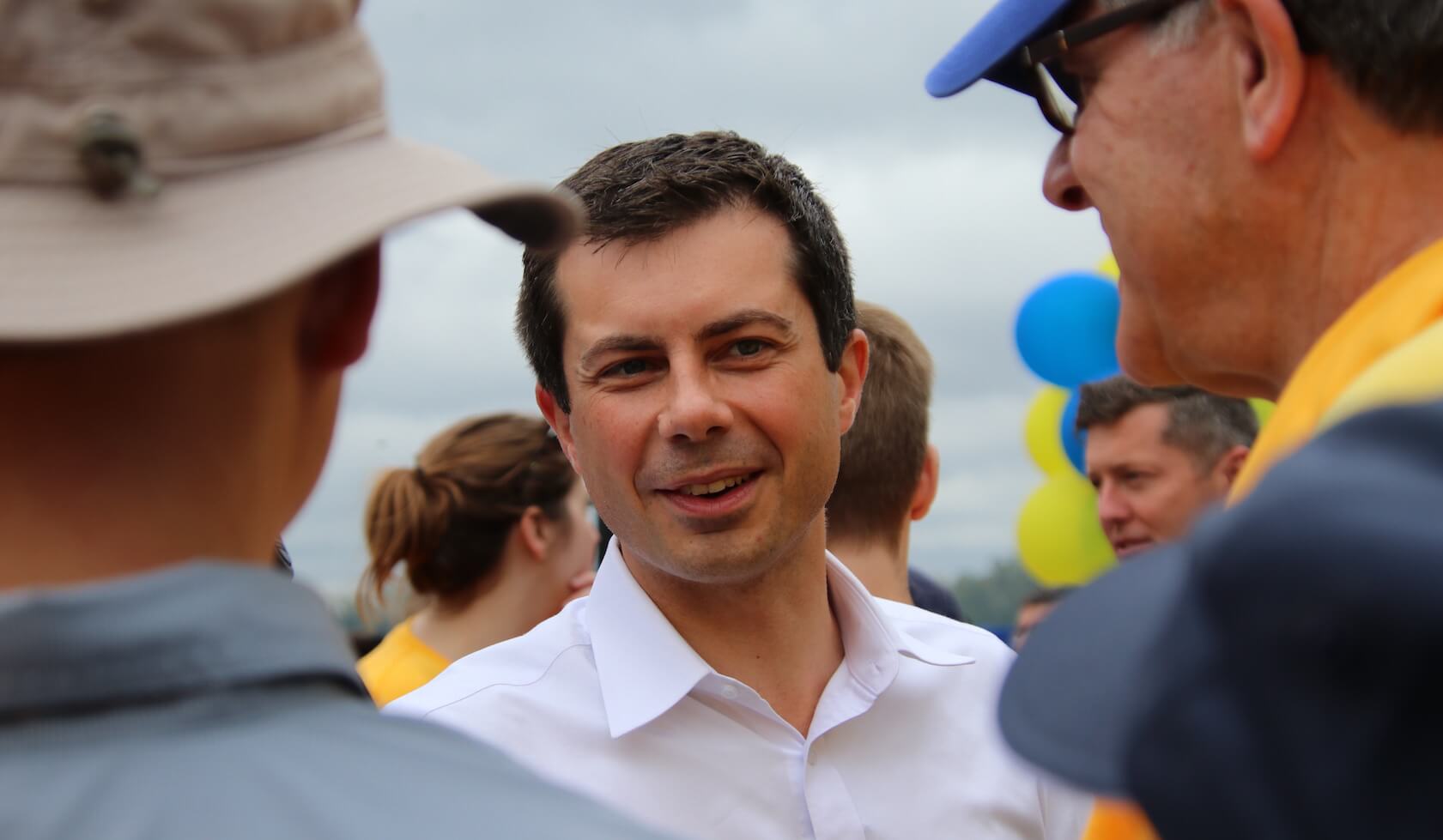
Free elections hold democracy together. But when some people can’t access the vote, or the integrity of the election is under question, Americans’ faith in democracy takes a hit.
In the wake of well-documented Russian interference in the 2016 election, and now with the news of President Trump’s politically-motivated conversation with the president of Ukraine, Americans increasingly are talking about the need for secure elections.
“One of the goals of interference is to delegitimize the election,” said Mayor Pete Buttigieg, on his campaign bus during a four-day tour of Iowa last week. “This is one of the reasons why I think, for the long run, reforms are so important.”
Indiana’s Poor Voting History
Indiana, a Republican-run state, is a good example of states with significant voting restrictions.
Buttigieg talked about accessibility barriers in his home state, like polls closing at 6 p.m. and suppressive voter ID laws Indiana helped pioneer.
“And in 2014, we had, I think, the lowest voter turnout rate in the country,” he said. “It’s pretty demoralizing to come home from Afghanistan and, you know, believe you’re fighting for democracy and see that your own state is a battle for turnout.”
[inline-ad id=”0″]
In 2014, overall turnout in Indiana was 30%. Turnout has increased since then, but it’s still low. In 2018, another midterm election year, turnout was 51%.
In South Bend, Indiana, Buttigieg works in a government building that serves as an early vote site, where he sees voter suppression measures every day during elections.
“There’s a poster on the door, and it’s a big stop sign,” he said. “And then it says all the terrible things that will happen if you don’t have your voter ID and all the reasons you shouldn’t vote unless you’re meeting all their criteria. And it really does have a chilling effect. And it makes our state less democratic in both senses.”
The responsibility for protecting elections in Indiana often falls to political campaigns, he said. Like in Iowa, volunteers and lawyers monitor every polling place to make sure people know their rights and don’t get turned away.
“Just as an experiment, once, I tried to vote with my military ID and I was turned away, which was incorrect on the law,” Buttigieg said. “But the person working in the polls didn’t know that. Course, I knew that I was entitled to vote and I had my driver’s license anyway, but how many people in that situation wouldn’t know their rights?”
[inline-ad id=”2″]
The Reforms to Save Democracy
Buttigieg has called for fair congressional districts and a national popular vote. Those reforms, he said, would make people confident their votes mattered in each election, thus increasing turnout.
The fact then-candidate Donald Trump welcomed the help of a foreign government in an election, Buttigieg said, was a sign of weakness within the Republican Party.
“I think you shouldn’t find it necessary to engage a foreign government to undermine the opponent if you think that you can win on the merits and win on the issues,” he said. “What we’re seeing is, increasingly, Republican strategy is not based on convincing a majority of the American people to agree with them.”
[inline-ad id=”1″]
Buttigieg has proposed other measures like: automatic voter registration, online and same-day voter registration, a national holiday for Election Day, ensuring access for people with disabilities, restoring felons’ voting rights, protecting access on tribal lands and addressing the impact of voter ID laws.
On his website, Buttigieg also lays out the 21st Century Voting Rights Act. The bill would implement the reforms listed above, but it also institutes a new pre-clearance procedure to block restrictive laws before they take effect.
Another part of the new Voting Rights Act develops policies to limit the spread of false information online.
The spread of false information was one of the main ways Russians interfered with the 2016 election, by creating fake accounts on Facebook and Twitter to sow divide and push lies about Hillary Clinton, Donald Trump and American politics.
Instead of fixing problems, Buttigieg said, Republicans only maintain the status quo or try to change the rules to benefit them.
For example, Senate Majority Leader Mitch McConnell has repeatedly held up votes on legislation to improve U.S. election security. Last week, McConnell finally agreed to put money toward the effort, after a year of stalling.
Part of the reason Buttigieg has called for a new Voting Rights Act is to establish a baseline of protections. He said a new law would be the best way to solve this problem, but until then, it’s up to campaigns and volunteers to preserve the right to vote.
“We can’t wait for those kinds of reforms to make sure everybody understands that if you care about where our country is headed, you’ve got to be part of the process right now,” Buttigieg said. “And I do think, never in my lifetime have people been more aware of the stakes. Even as people are frustrated, confused and troubled by the political reality.”
By Nikoel Hytrek
Photo by Julie Fleming
Posted 9/29/19
Politics

Biden marks Earth Day by announcing $7 billion in solar grants
The Biden administration on Monday announced the recipients of its Solar For All Program, a $7 billion climate program that aims to lower energy...

6 terrifying things that could happen if the Comstock Act is used to target abortion
Does 1873 sound like a really, really long time ago? Well, that’s because it is—but if Republicans and far-right anti-abortion activists have their...
Local News

No more Kum & Go? New owner Maverik of Utah retiring famous brand
Will Kum & Go have come and gone by next year? One new report claims that's the plan by the store's new owners. The Iowa-based convenience store...

Here’s a recap of the biggest headlines Iowa celebs made In 2023
For these famous Iowans, 2023 was a year of controversy, career highlights, and full-circle moments. Here’s how 2023 went for the following Iowans:...





